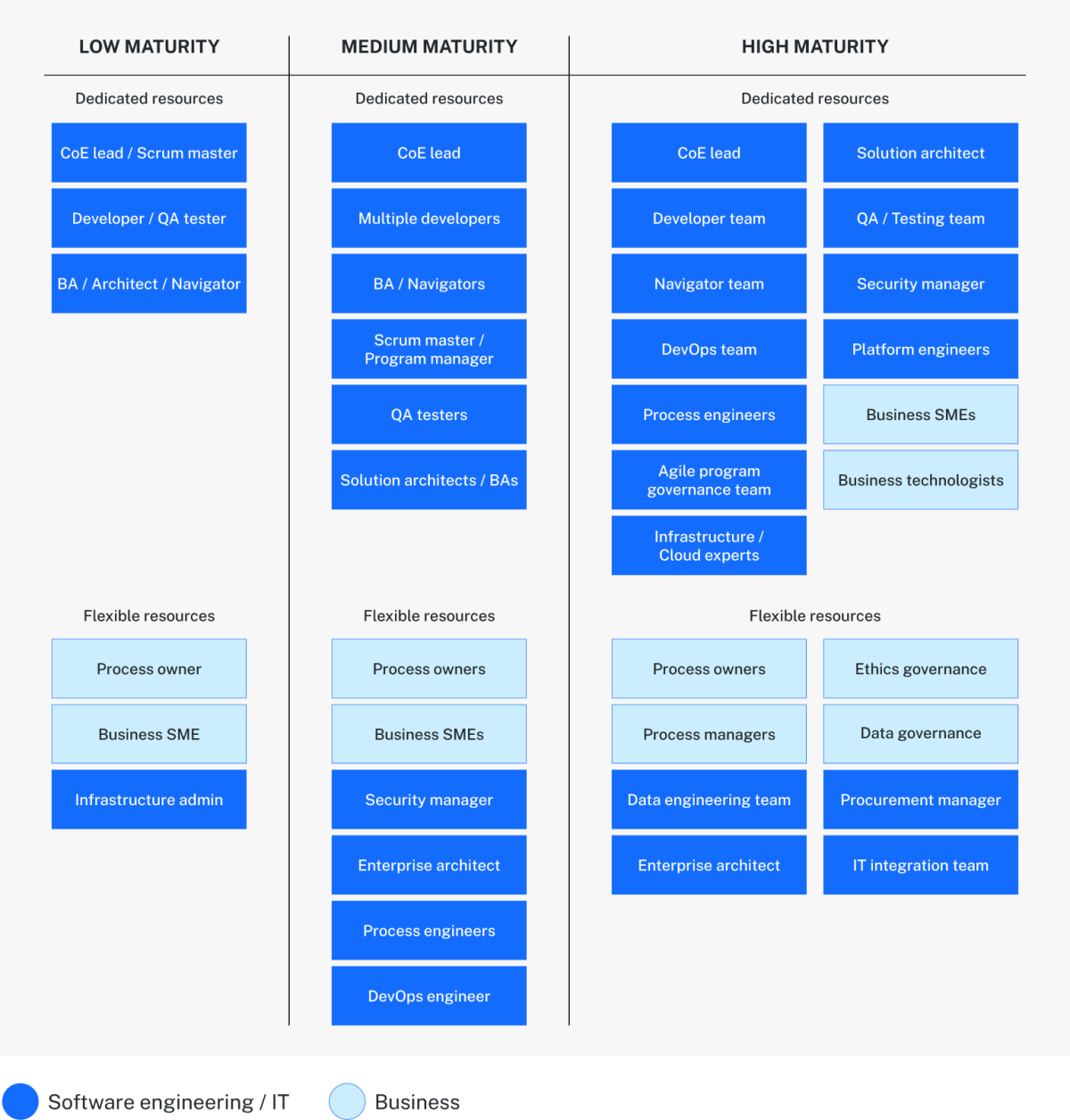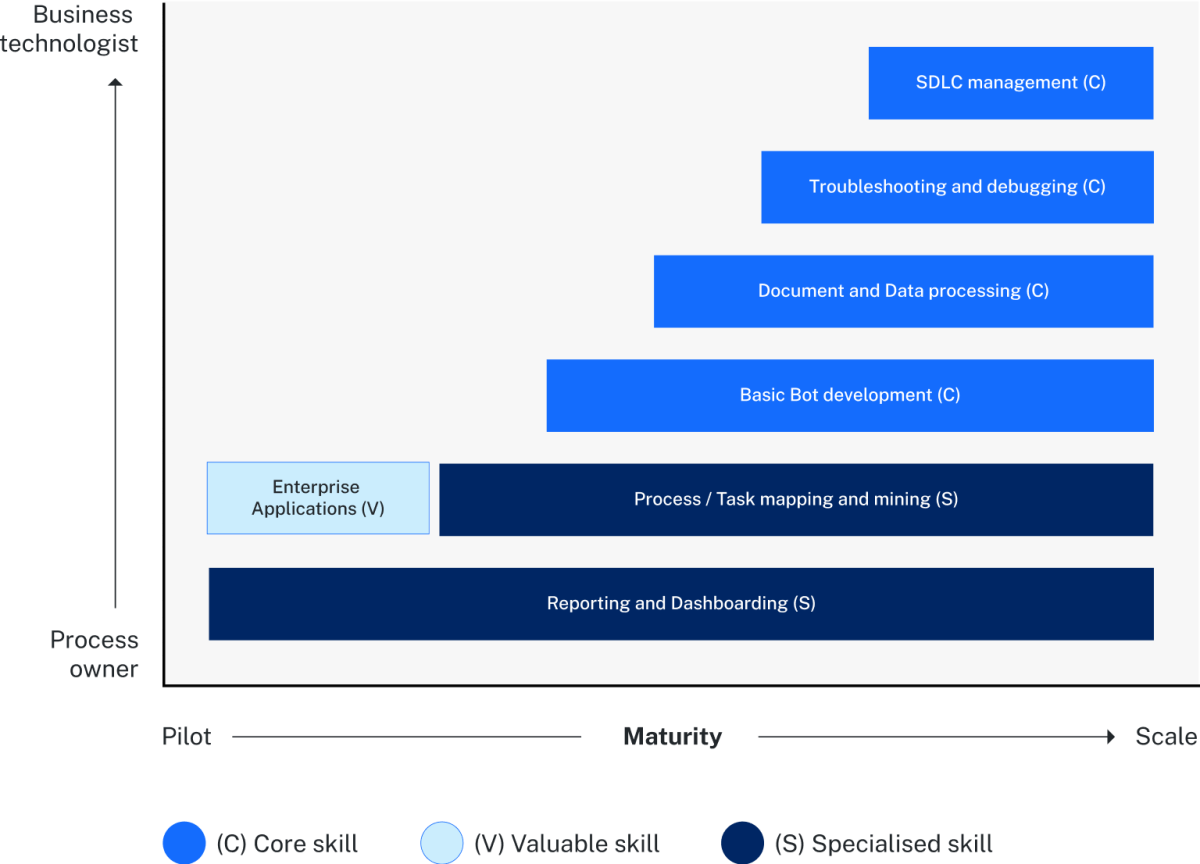Skills and capabilities
This module helps business leaders learn the automation and multidisciplinary domain skills required to achieve scale-level automation maturity.
Team skill set for automation excellence
Developing human capabilities is pivotal in the transformation of service and product delivery. This is particularly true when implementing automation. Success in automation requires skills across business, technology, and specialist expertise areas to enable discovery, build, run, and maintain stages of the lifecycle. Organisational capabilities and skills also need to increase in alignment with automation maturation. Government organisations must prioritise up-skilling their teams in alignment with their automation ambition to achieve optimal results.
Teams that yield high success rates embrace and are structured upon:
- Agile, collaborative ways of working
- Product-based teams comprised of business and technical professionals with multi-disciplinary skill rather than individual roles
- Appointing relevant business owners.
Multidisciplinary teams bring diverse and domain experience essential to automation initiatives. These teams possess domain expertise in business, technology, legal and compliance, and governance. The key domain areas include:
Business expertise:
- Domain experts or business process owner
- Business analysis.
Technology expertise:
- Automation technology and architecture expertise
- Artificial intelligence and data engineering
- Software development, quality assurance and user experience (UX) expertise
- IT infrastructure and operational expertise.
Risk, legal and compliance expertise:
- Data and ethics governance
- Procurement, compliance, and auditing
- Privacy and cybersecurity experience
- Administrative law and policy knowledge.
Governance experience:
- Program and project management framework i.e., waterfall/agile.
- Change management experience.
The skill sets of automation team members can be categorised into core, valuable, and specialist.33 The level of skill required depends on your automation maturity ambition, lifecycle phase, and chosen technology solution. The skill sets identified below are assessed based on their degree of impact, learning curve, and impedance. Impedance refers to the difficulty of adopting and implementing the skills or technologies, considering the associated learning curve.
Learn about the core, valuable, and specialist automation skills required to pilot and scale beyond RPA below.
Fundamental skills to achieve production readiness.
| Core skill | Description |
|---|---|
| Basic bot development |
Create straight forward automation scenarios using graphical user interfaces or pre-integrated templates. Positive impact: High |
| Advanced bot development |
Create automations that integrate with external systems, comply with regulatory requirements, handle complex decision logic and manage repetitive tasks. Positive Impact: High |
| Document and data processing |
Extract and prepare data from business applications and documents. Positive Impact: High |
| SDLC management |
Software development lifecycle (SDLC) management applies practices such as documentation, testing, and change management to ensure code security and reliability. Positive Impact: High |
| Platform operation |
Maintain and operate automation platform to ensure reliability of automation environments. Positive Impact: Significant |
| Enterprise applications |
Apply root cause analysis (RCA) during any phase of the automation lifecycle. Positive Impact: High |
| Automation testing |
Define and execute user and functional tests to ensure business and technical requirements are met. Positive Impact: Significant |
Skills valuable in automation adoption vary by use-case. These skills extend automation within the organisation through new use cases or optimisation. Your organisation should prioritise them based on the use case and operational requirements.
| Skill | Description |
|---|---|
| Automation architecture |
Ability to identify the optimal approach amongst available options. Positive impact: Significant |
| API integration |
Integrating external systems with different types of APIs and handling their programmatic responses. Positive Impact: High |
| Development languages |
Develop objects and scripts in different software languages. Positive Impact: Significant |
| Troubleshooting and debugging |
Understanding enterprise applications use and architecture for business rules enforcement and integration optimisation. Positive Impact: High |
Skills that extend automation value in limited cases. Investing in them must be justified.
| Skill | Description |
|---|---|
| Process and task mining |
The ability to leverage mining tools to analyse and generate process flow diagrams detailing every step, decision path, and step duration. Positive impact: Significant |
| AI and ML |
Incorporate external ML systems to tackle specific use cases that require classification, prediction, or pattern detection. Positive Impact: High |
| Reporting |
Extending monitoring capabilities to report and measure automation impact on business. Positive Impact: Significant |
| Ethics |
Ensure that automation solutions align with ethical standards and guidelines to prevent biases and promote fairness, transparency & accountability. Positive Impact: High |
| Governance, risk, and compliance |
Implement policies and procedures to ensure that automation solutions comply with regulatory requirements and manage associated risks. Positive Impact: Significant |
| Data governance |
Establish and maintain data management practices to ensure data quality, consistency, and security across automation processes. Positive Impact: High |
Building an automation centre of excellence
A Centre of Excellence (CoE) is an organisational team designed to promote best practices, enhance expertise, and foster innovation in automation.34 Establishing a CoE ensures your organisation achieves scaled automation excellence. It fosters collaboration and sustains automation across all maturity stages, maximising value and impact scaling appropriate to the organisation automation maturity.
A CoE follows a structured approach to achieve operational excellence, ensuring the automation lifecycle is followed to realise benefits. They govern automation operations to deliver consistent quality from ideation to deployment.
In the pilot level, the CoE identifies and assesses initial automation initiatives. During implement level, they establish best practices and governance frameworks. As automation expands, the CoE enables broader adoption, knowledge sharing, and training. At the scaling level, the CoE leads strategic planning to align automation initiatives with organisational goals, driving innovation and continuous process optimisation.
Operational excellence in automation CoE
Discover: identify and evaluate
- Process discovery and mining
- Requirement gathering.
Build: design and build
- Process design document
- Solution development.
Run: test and deploy
- Deployment strategy
- Acceptance testing
- Business continuity plan.
Monitor: measure and monitor
- Performance monitoring
- Change management
- Break and fix management
- Security and operational management.
CoE roadmap aligned to automation maturity
The expansion of the CoE should align with the automation initiatives and organisational automation maturity.39 Justified by scope, scale, and business KPIs, the COE expands with a mix of full-time and part-time resources comprised of business, technology, and domain specialist expertise. The goal is for the CoE to scale from pure technology-based roles into multi-disciplinary capabilities. The CoE should collaborate with business process owners at early stages, leveraging low code no code developing practices where possible, so that both business and technology-based roles are employed to build multidisciplinary teams.
| Early stage | Intermediate stage | Mature stage | |
|---|---|---|---|
| Scope |
Organisation charters a CoE team:
|
Pilot and implement early automation deliverables:
|
Organisation expands and scales automation initiatives:
|
| Skills |
|
|
|
| Process and engagements |
|
|
|
| Technology |
|
Automation platform ecosystem:
|
Fully integrated platform:
|
CoE team composition through maturity

Empower business technologists
Empowering employees to become business technologists is essential to achieve automation excellence. Upskilling your team in essential automation skills will progress your organisation towards self-sufficiency. Fostering a culture where employees are encouraged to become developers will also accelerate the adoption of innovation and automation in your organisation. It will cultivate your workforce's ability to effectively identify and address business challenges.
Empowering employees to become business technologists allows your organisation to tap into the collective knowledge and creativity of your workforce. Employees will be motivated to identify automation opportunities, develop solutions, and address business challenges more effectively. Your organisation should provide education, training, resources, and rewards so that employees are enabled to achieve their full potential as business technologists.
The following table describes the investment in employees needed by organisations to achieve business value:
| Business value | Investment in employees required |
|---|---|
| Faster time-to-benefit | Education and training in automation and associated skills. |
| Accelerated innovation | Establish communities that share knowledge and collaborate. |
| Increased return on investment | Provide the tools, guidelines and resources to business technologists. |
| Employee engagement | Training in pipeline contribution and ideation skills. |
Scaling skills for automation
The figure below shows the necessary skills for business technologists (non-IT) as the organisation matures from pilot to scale. Scaling skills relative to maturity, ensures the appropriate skills and capabilities are in place when required.
